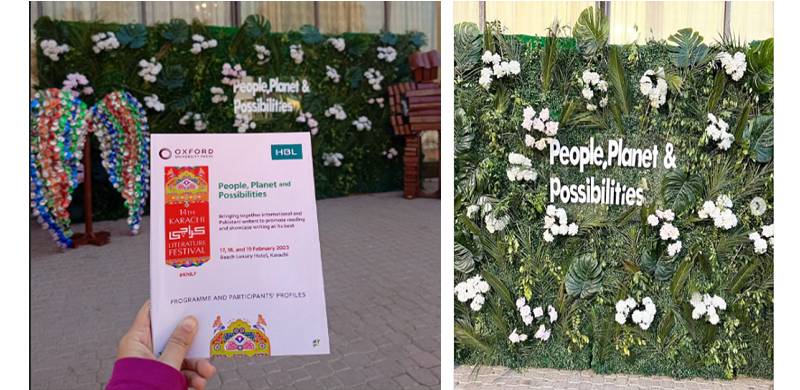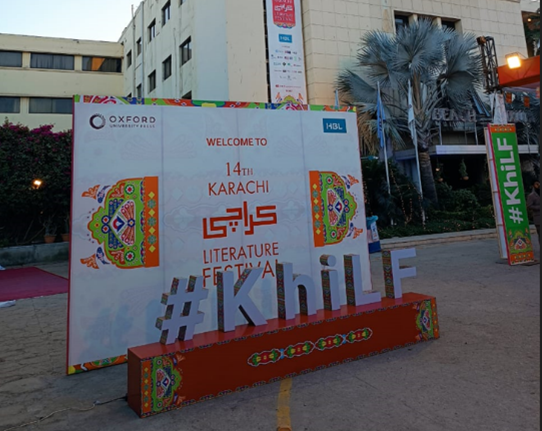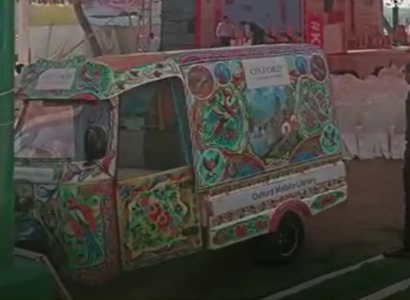
Having never attended any Karachi Literature Festival (KLF) events – despite being an avid reader – I wasn’t sure what to expect. Academics, educationists, literary icons/luminaries/enthusiasts? Emerging and/or aspiring writers? Academics? Book launches, citations, readings? Maybe a combination of all of this? Mind you, my being an ‘avid’ reader is itself a self-proclaimed description and the logical first step would have, therefore, been to visit their online presence.
This would be the 14th annual chapter of the KLF and their official website states that their mission is to “create an intellectual space in which the diversity and pluralism in Pakistan’s society and this is expressed by the authors from literary and cultural traditions beyond Pakistan’s borders are freely accessible to people in an open and participatory manner”. The theme for this year is People, Planet and Possibilities: focusing on Pakistan’s current economic and geo-political challenges, the impact of climate change and quoting Arshad S. Husain Sahib (MD Oxford University Press (OUP)) from his welcome speech:
“To talk about these critical issues, to deliberate on finding solutions and possibilities”.
So, here we go. At the Beach Luxury Club during the weekend of the 17th, 18th and 19th of February 2023, what I witness is unbelievably surreal – given what happened Friday (17 February) at Shahrah-e-Faisal. Admittedly, I did doubt the KLF would go as per schedule and program – but, Dear God, did it deliver! Entering the venue, a touch of Pakistaniyat was felt. Maybe it was the Truck Art on the OUP Mobile Library, or possibly the presence of Peak Freans as a sponsor that gave off the quintessential Pakistani feel, in the larger picture. Alternatively, sponsors representatives from HBL and Getz Pharma spoke about the resilience of Pakistan. Quoting Ali Habib Sahib (Chief Marketing and Communication HBL):
 “We look at KLF as a harbinger of hope, in a time which is turbulent – both domestically and internationally, we talk about the Higher Order. We also realise that in an environment that talks about economic hardship, the greatest antidote to this is a resilient society. And what better ingredient to a strong society is culture and books?”
“We look at KLF as a harbinger of hope, in a time which is turbulent – both domestically and internationally, we talk about the Higher Order. We also realise that in an environment that talks about economic hardship, the greatest antidote to this is a resilient society. And what better ingredient to a strong society is culture and books?”
I have only recently developed my personal sense of owning Pakistan and the KLF 2023’s opening ceremony served to strengthen this ownership.
Having studied the programme prior to making my rounds at the event, I knew I wanted to attend the tribute to Faiz Ahmad Faiz and Iqbal Bano, titled “Raks-e-Shukr,” by Farah Yasmeen Shaikh. Farah Yasmeen Shaikh is an internationally acclaimed Kathak performer, choreographer and instructor, and Founder & Artistic Director of Noorani Dance. For her performance at KLF-2023’s opening ceremony, she was accompanied by her entourage. As my first experience of viewing any Kathak performance, her group’s ability to combine beauty, grace and history in one frame was truly a delight to watch. This performance was sponsored by Herbion Naturals.
The event seemed to have been spread out across Beach Luxury Hotel and while different sub-events were happening in different areas of the hotel, one particular exhibit caught my attention. Located at the garden behind Casbah was a Special Feature: An exclusive Art Exhibition by HBL. An open art festival, Ali Habib sahib quoted this to being amongst the very largest – if not the largest – art collection in Pakistan that HBL curates. But given that this was my first experience at any KLF, I had a very specific agenda.
As somebody who works with the financial sector in Pakistan, I looked forward to “A Bank is Born,” moderated by Naureen Hyat and including Ishrat Husain, Syed Salim Raza, Shamshad Akhtar, Nadeem Hussain and Akbar Zaidi as speakers. This happened on Day 1 of the event and was essentially the launch of A Bank is Born by Nadeem Hussain Sahib from Planet N Group. Moderator Naureen Hyat very candidly described it as:
“A Bank is Born is a beautiful yet candid collage of Nadeem Hussain’s personal and professional life from early schooling to his college, from an employee of multinational conglomerate to becoming a financial inclusion entrepreneur.”
Financial inclusion for Pakistan, at large, has been the buzzword for several years now and has recently been mandated by the State Bank of Pakistan (SBP). Existing commercial banks cater to a particular segment of our society comprising corporates, high net worth individuals, trade financers and several big commercial houses. “But they were not actually going to a majority of the population,” said Dr. Ishrat, adding that this particular sector was earlier excluded from the financial system. And it is common knowledge that informal sector, especially at the lower end was resorting to money lenders “who were sharks in their way of dealing with them”. To hear about how Microfinance Banks were born and made a part of our current financial ecosystem was truly enlightening.
Day 2 had “Pakistani Drama: Kahaan Se Aaya Kahaan Gaya Woh,” which was moderated by Raju Jamil and speakers included Bee Gul, Nadeem Baig, Behroze Sabzwari, Shameem Hilaly, Shahzad Sheikh and Kubra Khan. As a nation, we’re very proud of the drama serials we’ve produced. Shamim Hilaly spoke about an era of only live broadcasts, akin to stage performances that had absolutely zero margin for errors, mistakes or any retakes, in the process. Recall that this was the era when “TV viewing” was available for maximum three or four hours and there was an abundance of “intezaar farmaye” as Raju Jamil Sahib said. This raised a very pertinent point that was also spoken about – where audiences now have the leverage to switch between channels during commercial breaks, aka, channel hopping. Themes were spoken about – where Tanhaiyaan was remembered as being very relaxing and drama serials of that era were described as being very inspirational and progressive for their times. Sinf-e-Ahan famed Kubra Khan gave a very interesting comparison, saying that it was all about “exposure.” To quote her: with everything either being “over the top” and / or “over exposed” to us through multiple channels and outlets, it would be interesting to see how far Pakistani dramas can continue to stay in the aforementioned “enlightening category”. More importantly, though, the question is — do they really need to?
The event was spread out over three days, with multiple talks, book launches and prizes simultaneously being executed. A strong sense of Pakistaniyat continued to echo in each of these sub-events – that covered topics like “Search for Peace & Security Among Neighbours,” “Liberal Arts Education,” “Sindh’s Mystical Landscape,” “Cricket” and even “Pop Music” in Pakistan! Feature Film Quaid-e-Azam Zindabad was shown and Gluco Kahani (as a book) was launched by Bilal Maqsood. The closing ceremony included a planned Noori concert, where focus should be on the “openness”. While everyone knew that entrance and access to the three-day event was free of cost, friends who attended mentioned “what was truly endearing was the fact that – on the face of it, this concert was flawlessly executed. The elderly, youngsters and even single males could be seen! It was a truly exhilarating experience.” I guess life has a way of leaving things to desire and for me, maybe it was this Noori concert (*sigh*).
To (again) quote Ali Habib sahib from HBL, this event truly “proved to be a triumph of passion that turned an idea into reality […]; a tale of perseverance[..], where dreams were translated into words, poetry and prose.”
For somebody whose sense of Pakistaniyat is still very new, it was hard not to immerse myself into this event. And for the confused ‘Westernised’ desi that I (and many others) often tend to be, that was a huge achievement.
This would be the 14th annual chapter of the KLF and their official website states that their mission is to “create an intellectual space in which the diversity and pluralism in Pakistan’s society and this is expressed by the authors from literary and cultural traditions beyond Pakistan’s borders are freely accessible to people in an open and participatory manner”. The theme for this year is People, Planet and Possibilities: focusing on Pakistan’s current economic and geo-political challenges, the impact of climate change and quoting Arshad S. Husain Sahib (MD Oxford University Press (OUP)) from his welcome speech:
“To talk about these critical issues, to deliberate on finding solutions and possibilities”.
So, here we go. At the Beach Luxury Club during the weekend of the 17th, 18th and 19th of February 2023, what I witness is unbelievably surreal – given what happened Friday (17 February) at Shahrah-e-Faisal. Admittedly, I did doubt the KLF would go as per schedule and program – but, Dear God, did it deliver! Entering the venue, a touch of Pakistaniyat was felt. Maybe it was the Truck Art on the OUP Mobile Library, or possibly the presence of Peak Freans as a sponsor that gave off the quintessential Pakistani feel, in the larger picture. Alternatively, sponsors representatives from HBL and Getz Pharma spoke about the resilience of Pakistan. Quoting Ali Habib Sahib (Chief Marketing and Communication HBL):
 “We look at KLF as a harbinger of hope, in a time which is turbulent – both domestically and internationally, we talk about the Higher Order. We also realise that in an environment that talks about economic hardship, the greatest antidote to this is a resilient society. And what better ingredient to a strong society is culture and books?”
“We look at KLF as a harbinger of hope, in a time which is turbulent – both domestically and internationally, we talk about the Higher Order. We also realise that in an environment that talks about economic hardship, the greatest antidote to this is a resilient society. And what better ingredient to a strong society is culture and books?”I have only recently developed my personal sense of owning Pakistan and the KLF 2023’s opening ceremony served to strengthen this ownership.
Having studied the programme prior to making my rounds at the event, I knew I wanted to attend the tribute to Faiz Ahmad Faiz and Iqbal Bano, titled “Raks-e-Shukr,” by Farah Yasmeen Shaikh. Farah Yasmeen Shaikh is an internationally acclaimed Kathak performer, choreographer and instructor, and Founder & Artistic Director of Noorani Dance. For her performance at KLF-2023’s opening ceremony, she was accompanied by her entourage. As my first experience of viewing any Kathak performance, her group’s ability to combine beauty, grace and history in one frame was truly a delight to watch. This performance was sponsored by Herbion Naturals.
The event seemed to have been spread out across Beach Luxury Hotel and while different sub-events were happening in different areas of the hotel, one particular exhibit caught my attention. Located at the garden behind Casbah was a Special Feature: An exclusive Art Exhibition by HBL. An open art festival, Ali Habib sahib quoted this to being amongst the very largest – if not the largest – art collection in Pakistan that HBL curates. But given that this was my first experience at any KLF, I had a very specific agenda.
As somebody who works with the financial sector in Pakistan, I looked forward to “A Bank is Born,” moderated by Naureen Hyat and including Ishrat Husain, Syed Salim Raza, Shamshad Akhtar, Nadeem Hussain and Akbar Zaidi as speakers. This happened on Day 1 of the event and was essentially the launch of A Bank is Born by Nadeem Hussain Sahib from Planet N Group. Moderator Naureen Hyat very candidly described it as:
“A Bank is Born is a beautiful yet candid collage of Nadeem Hussain’s personal and professional life from early schooling to his college, from an employee of multinational conglomerate to becoming a financial inclusion entrepreneur.”

Financial inclusion for Pakistan, at large, has been the buzzword for several years now and has recently been mandated by the State Bank of Pakistan (SBP). Existing commercial banks cater to a particular segment of our society comprising corporates, high net worth individuals, trade financers and several big commercial houses. “But they were not actually going to a majority of the population,” said Dr. Ishrat, adding that this particular sector was earlier excluded from the financial system. And it is common knowledge that informal sector, especially at the lower end was resorting to money lenders “who were sharks in their way of dealing with them”. To hear about how Microfinance Banks were born and made a part of our current financial ecosystem was truly enlightening.
Day 2 had “Pakistani Drama: Kahaan Se Aaya Kahaan Gaya Woh,” which was moderated by Raju Jamil and speakers included Bee Gul, Nadeem Baig, Behroze Sabzwari, Shameem Hilaly, Shahzad Sheikh and Kubra Khan. As a nation, we’re very proud of the drama serials we’ve produced. Shamim Hilaly spoke about an era of only live broadcasts, akin to stage performances that had absolutely zero margin for errors, mistakes or any retakes, in the process. Recall that this was the era when “TV viewing” was available for maximum three or four hours and there was an abundance of “intezaar farmaye” as Raju Jamil Sahib said. This raised a very pertinent point that was also spoken about – where audiences now have the leverage to switch between channels during commercial breaks, aka, channel hopping. Themes were spoken about – where Tanhaiyaan was remembered as being very relaxing and drama serials of that era were described as being very inspirational and progressive for their times. Sinf-e-Ahan famed Kubra Khan gave a very interesting comparison, saying that it was all about “exposure.” To quote her: with everything either being “over the top” and / or “over exposed” to us through multiple channels and outlets, it would be interesting to see how far Pakistani dramas can continue to stay in the aforementioned “enlightening category”. More importantly, though, the question is — do they really need to?
The event was spread out over three days, with multiple talks, book launches and prizes simultaneously being executed. A strong sense of Pakistaniyat continued to echo in each of these sub-events – that covered topics like “Search for Peace & Security Among Neighbours,” “Liberal Arts Education,” “Sindh’s Mystical Landscape,” “Cricket” and even “Pop Music” in Pakistan! Feature Film Quaid-e-Azam Zindabad was shown and Gluco Kahani (as a book) was launched by Bilal Maqsood. The closing ceremony included a planned Noori concert, where focus should be on the “openness”. While everyone knew that entrance and access to the three-day event was free of cost, friends who attended mentioned “what was truly endearing was the fact that – on the face of it, this concert was flawlessly executed. The elderly, youngsters and even single males could be seen! It was a truly exhilarating experience.” I guess life has a way of leaving things to desire and for me, maybe it was this Noori concert (*sigh*).
To (again) quote Ali Habib sahib from HBL, this event truly “proved to be a triumph of passion that turned an idea into reality […]; a tale of perseverance[..], where dreams were translated into words, poetry and prose.”
For somebody whose sense of Pakistaniyat is still very new, it was hard not to immerse myself into this event. And for the confused ‘Westernised’ desi that I (and many others) often tend to be, that was a huge achievement.

